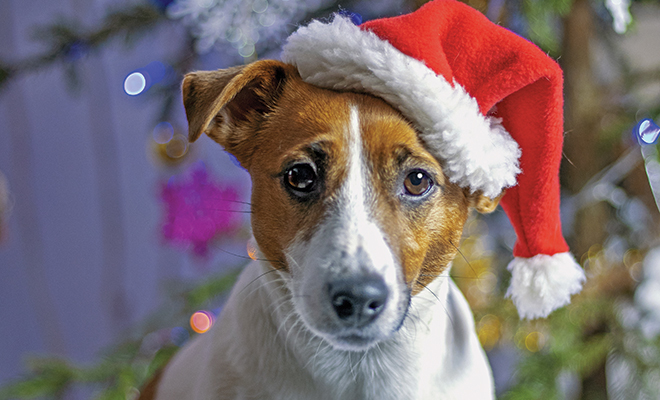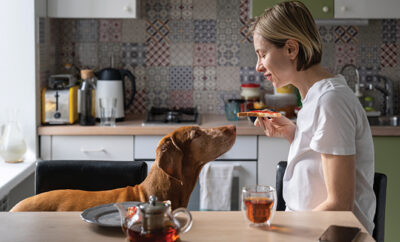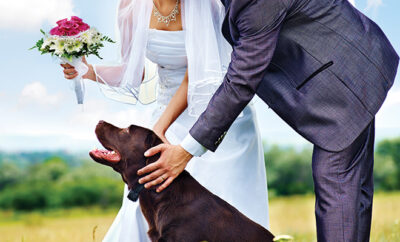
Holiday Safety for Fur Babies
The weeks between Thanksgiving and New Year’s Day are a busy time for most families, with shopping, celebrations and lots of good things to eat.
Amid the festivities, don’t forget that the holiday season can bring safety hazards for your pets. Here are some tips to help you make sure the holidays are happy for all the members of your household.
Minimize Pet Stress
Holiday visitors and a disruption of normal routine can stress pets out. Visitors may not know how to behave around your pet, so provide helpful tips and give everyone time to get acquainted. Make sure your pet has a quiet place to hide out when things get too noisy. Sticking to your pet’s eating and exercise routines will also help cut stress.
Keep Rich Foods on the Table
The holidays are a time for feasting, but do your pet a favor and avoid the urge to share the feast. Turkey skin, gravy and other rich and spicy holiday foods can lead to stomach problems in pets, including pancreas issues caused by high-fat foods. According to Colorado veterinarian Dr. Jennifer Deming, veterinarian offices experience an uptick in cases of animal pancreatitis in the days following Thanksgiving. You should also avoid giving turkey bones to dogs since they can splinter and cause internal damage. Be on the safe side; let your family and guests know that holiday leftovers are for humans only.
Hide Toxic Sweets
Many human treats, most notably chocolate, are toxic for dogs and cats and can cause serious health problems and even death. Other sweet threats include macadamia nuts and artificial sweeteners, while hard candy and candy wrappers can cause choking. Make sure you store sweets where your pet can’t find them.
Secure your Tree
Your tree may represent a climbing challenge for your dog or cat, so be sure to securely anchor it. The sharp needles from your tree can be harmful if eaten. In addition, the water in your tree stand could contain fertilizers, bacteria or other substances that shouldn’t be ingested. Locating your tree in a corner of the room or behind a baby gate will help minimize pet access. Pet birds have a reputation for getting into trouble with holiday decorations, so resist the urge to release them near the tree or watch them carefully if you do.
Ditch Dangerous Decorations
Decorations can also be a problem for your pet. If ingested, small Styrofoam or glass ornaments can wreak havoc on a pet’s digestive system, so place them up high and out of reach. An alternative is to decorate with larger plastic ornaments. Also, make sure electrical cords for holiday lights are safely hidden so pets can’t bite them.
Avoid Poisonous Holiday Plants
Many of the special plants we use for holiday decorating can make our pets sick. Mistletoe, poinsettias, holly and some types of lilies can be toxic, so keep them away from your pet. You may want to invest in silk holiday plants that look real and are non-toxic.
Watch the Wrapping
Keep an eye on cats and puppies while wrapping and unwrapping gifts. Some gift-wrapping supplies such as paper, ribbon and string may seem like a toy to a playful animal but could cause serious problems if swallowed. Tinsel is especially dangerous for cats and may require emergency surgery to remove from the animal’s intestines.
Be Cautious with Candles
Candles and luminaries are an essential part of many holiday traditions. Unattended candles are always a problem in the home, but having pets that can knock candles over or burn themselves adds a new twist. Always place candle holders in safe places out of the reach of pets and don’t leave a candle burning when you leave a room. Consider using glass chimneys to protect lit candles or avoid the problem altogether with battery-operated flameless candles that flicker like the real thing.
Be Sensitive about New Year’s Noise
The countdown to the New Year can be an especially stressful time for household pets. Noisemakers, poppers and fireworks can frighten your dog or cat enough to make them hide or run away. If your pet has noise anxiety, prepare an escape-proof refuge with food, water and a place to snuggle ahead of time. You may also want to talk to your vet about an animal tranquilizer if you expect fireworks.
A final tip: beware of flimsy novelty gifts for pets that show up in stores around the holidays. Instead, look for pet gifts that are healthy and practical, such as a new bed, collar or durable chew toy. For more information about keeping pets safe and happy during the holidays and throughout the year, visit the ASPCA’s website.
Sources: zukes.com, aspca.com and avma.com.







